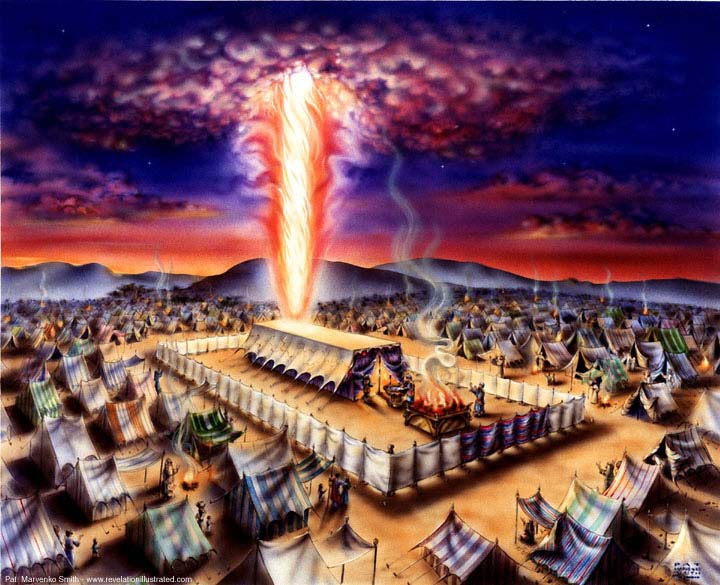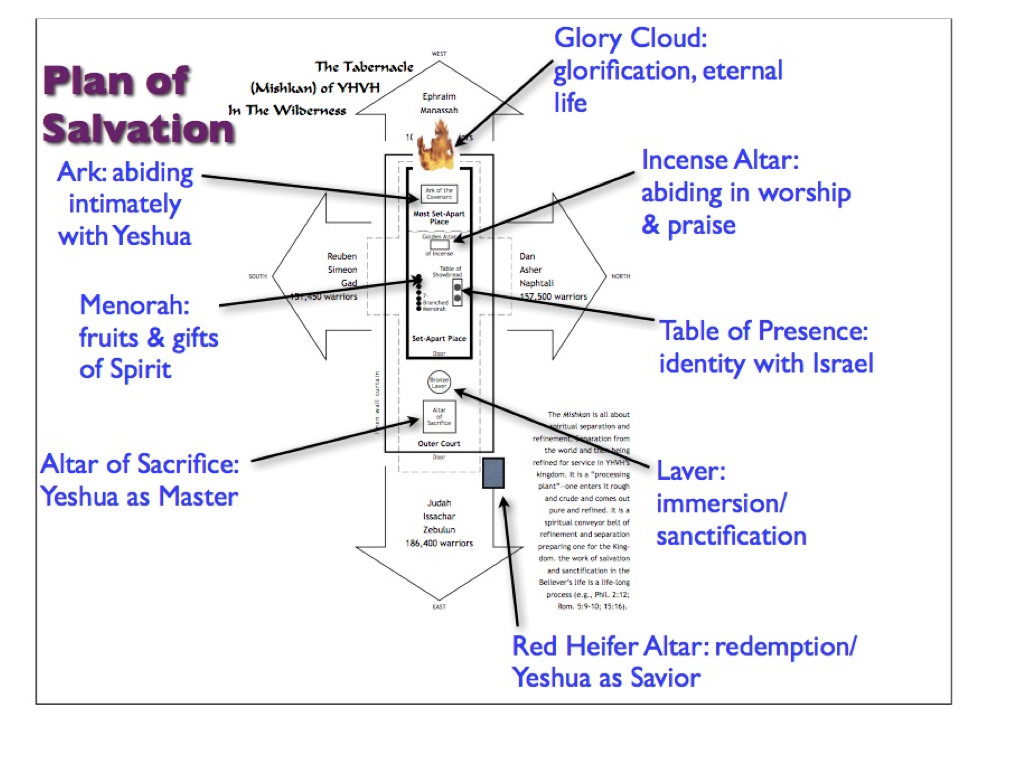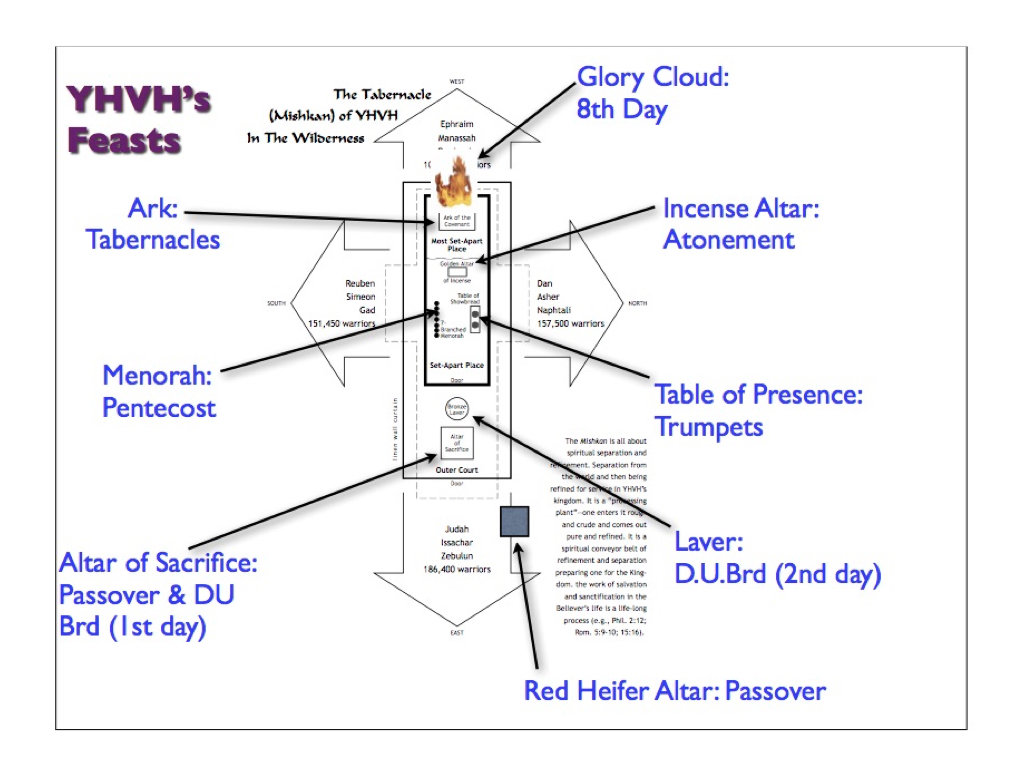In this video, I closed my eyes and opened the Bible and taught on the Scriptures where my finger landed. I first opened my Bible to Proverbs 7:1–9 (on how YHVH’s Torah-law will protect us from evil), then to Hebrews 1:1–10 (on how Yeshua was the God of the Old Testament), and finally to Joshua 22:43–45 (on the rest of YHVH and how it relates to salvation, the kingdom of Elohim, the seventh day Sabbath and the Millennium). And I have a special treat for you at the end of this video. Please enjoy and be blessed as the Word of Elohim edifies you.
Category Archives: Gospel Message/Salvation
Behar—”You call me Lord, Lord, but you don’t…”
First Fruits Day Prophesies Yeshua’s Death, Resurrection & Ascension
This video explains how Yeshua’s burial, resurrection and ascension to heaven was prophesied in minute detail 1,500 years earlier in the Torah’s amazing First Fruits Day barley grain rituals and some 700 years earlier in Isaiah 53. You will also learn what happened to Yeshua’s soul while he was in the grave and how that relates to his paying the price for our sins. Also learn why the New Testament mentions the death of Yeshua twice as many times as his resurrection. This information will strengthen your faith in the fact the the Bible is the divinely inspired, revealed Word of YHVH Elohim, and that Yeshua/Jesus is who the Bible says he is—the promised Messiah and humanity’s Savior or Redeemer who offers all who will believe in and follow him not only salvation from sin’s death penalty, but eternal life or immortality. Prepare to be amazed and inspired!
Why Does the New Testament Emphasize the Death of Yeshua More Than His Resurrection?

The Testimony of Yeshua (or New Testament) has more than twice as many references to the death of Yeshua (more than 99 references) than to his resurrection (approximately 49 references). Why is this? Why did the apostolic writers emphasize the death of Yeshua the Messiah more than his resurrection? This fact has perplexed some of us for years. We now will briefly explore why this may be.
To be sure, the resurrection of Yeshua is a momentous event in the history of the world not to be minimized or understated in any way, and is not sub par to the importance of his incarnation, life or death. Furthermore, had Yeshua not resurrected from the dead, there would be no hope of the resurrection of the saints, for as Paul writes,
And if Messiah is not risen, then our preaching is empty and your faith is also empty. Yes, and we are found false witnesses of Elohim, because we have testified of Elohim that He raised up Messiah, whom He did not raise up—if in fact the dead do not rise. For if the dead do not rise, then Messiah is not risen. And if Messiah is not risen, your faith is futile; you are still in your sins! Then also those who have fallen asleep in Messiah have perished. If in this life only we have hope in Messiah, we are of all men the most pitiable. (1 Cor 15:14–19)
Adding to the perplexing fact that the Testimony of Yeshua emphasizes the death of Yeshua over his resurrection is that notable fact that of the seven biblical feasts mentioned in Leviticus 23 and elsewhere in Scripture, there no feast that specifically points to the resurrection of Yeshua. The day of Passover addresses Yeshua’s death and the Feast of Unleavened Bread, the next biblical feast completely skips past the resurrection altogether. This is the Feast of Weeks, which corresponds to the day of Pentecost in Acts chapter two, which also occurred fifty days after Yeshua’s resurrection.
So why is there no biblical holiday, contrary to popular but ill-informed opinion, specifically portraying the resurrection of the Messiah? In answer to this question, some Bible students will point to the so called “Feast” of First Fruits (Lev 23:9–13) as the biblical holiday that answers to the resurrection of Yeshua. While First Fruits Day (the correct biblical name for this occasion) does definitely point prophetically to Yeshua’s resurrection and ascension to heaven, this day, according to the Torah, was neither a biblical feast or miqra kodesh or a high holy day Sabbath. Rather, it was a moed or divine appointment (all biblical feasts are moedim [the plural of moed], but not all moedim are feasts) on which the Levitical priest performed the ritual of offering up a sheaf of the barley first fruits before Elohim. But for the rest of the Israelites, First Fruits Day was not a Sabbath-day of rest or holy or sacred assembly (Heb. miqra kodesh). Rather it was a common work day when the Israelites went into their fields to harvest the newly ripened barley. (I discuss this subject at length in my 23 page article on this subject available at https://www.hoshanarabbah.org/pdfs/firstfruits.pdf.) To call First Fruits Day a feast is a misreading, if not a twisting, of Scripture. Facts are stubborn things for some people to deal with, but facts are truth, and truth is still truth regardless of people’s opinions to the contrary.
So now let us attempt to answer the question of why there is no biblical feast that specifically commemorates the resurrection of our Master and Savior, Yeshua the Messiah, and why the apostolic writers of the Testimony of Yeshua emphasized the death of Yeshua more than twice as much as his resurrections. First, it is the death of Yeshua and the shedding of his blood that saved humans from their sins, not his resurrection. Scripture is clear on this in both the Tanakh or Old Testament and the Testimony of Yeshua, for the Word of Elohim teaches us that the shedding of blood atones for man’s sin (for scriptural proof, see my article on this at https://www.hoshanarabbah.org/pdfs/atone.pdf). The New Testament Scriptures clearly state that Yeshua’s shed blood and not his resurrection is what redeemed or saved man from sin’s death penalty. One passage that specifically states this is Romans 4:25,
Continue reading →The Saint’s Destiny as a “Deified” Child of Elohim/God
Theosis: The “Deification” of Man and the Tabernacle of Moses and the Biblical Feasts
The Tabernacle of Moses from its entrance to the its innermost room represents one’s progression in their spiritual journey starting with initial salvation progressing to the glorification of the physical body and eternal life in YHVH’s eternal spiritual kingdom.
Entering through the front door of the tabernacle and progressing to the holy of holies is from the human perspective as one moves toward Elohim; it is the perspective of moving from the human to the spiritual plane of existence or that of the earthbound looking heavenward. However, from YHVH Elohim’s view from the glory cloud that has hovering over the holy of holies just above the ark of the covenant, the perspective was different. It was from the inside looking out, or from heaven looking downward. We will discus the contrasting viewpoints between the human and divine in a moment.
In the outer court of the tabernacle, all the rituals and furnishings therein pointed to death and judgment, as well as to washing or cleansing. These prophetically foreshadowed salvation through Yeshua’s atoning death on the cross, with Yeshua being the door to salvation, and one’s need to accept his death on the cross for one’s sins followed by the need of baptism for the remission of sins.
In the set-apart (kadosh or holy) place inside the tabernacle, everything pointed to life, light, food, fragrant incense, the fruits and gifts of the Set-Apart Spirit—or life in a spiritual relationship with Elohim subsequent to one’s taking the beginning steps in the salvation process.
In summary, the outer court speaks of basic salvation for the redeemed believer in Yeshua, while the holy place speaks of spiritual growth and maturity, and of moving from spiritual babyhood and then growing into spiritual adulthood or maturity.
To understand this process of growing in spiritual maturity, it is necessary to comprehend the tripartite composition of the human being. Paul speaks of man being subdivided into three parts—body, soul and spirit (1 Thess 5:23). The tabernacle’s outer court seems to relate more to the physical or bodily realm of the person, while the holy place speaks more of the soul or intellectual, volitional and emotional aspects of one’s inner or psychological makeup. Finally, the holy of holies portrays man approaching YHVH through the realm of a person’s inner or personal spirit.
As one progresses into the tabernacle, it is as if YHVH is drawing a person into an ever deeper relational walk with him starting at the most basic level progressing upward until one is finally communing with YHVH on a Spirit-to-(human personal)-spirit level (in the most holy place). It is the Father’s desire that his children progressively grow until each of us is communing with him at the highest spiritual level (see John 4:23–24).
As noted earlier, this forward progression from the tabernacle’s entrance to its innermost room is but one way to view a person’s spiritual progression into the realm of the Spirit of Elohim. From YHVH’s perspective, looking from the inside of the tabernacle outward, the view changes. Although one has to enter the tabernacle through the outer gate and then go through various rites and rituals relating to a cleansing process before being allowed into the tabernacle itself, at the same time, we see YHVH starting to work with the person from the inside out. That is to say, when a person initially comes into a spiritual relationship with his Creator, YHVH first regenerates the person spiritually by putting his Set-Apart Spirit in the spirit of the person. In a sense, if the tabernacle is a picture of the tripartite subdivision of a person’s life (body, soul and spirit), then YHVH starts working from the inside out in one’s personal spirit, which is one’s personal holy of holies that is inside of them, if you will. From there, the Set-Apart Spirit goes to work on the person’s soul (mind, will and emotions) to transform it spiritually into the mind or image of Yeshua (Rom 8:28–29). This process will last a person’s lifetime. Finally, at the resurrection at Yeshua’s second coming, the saint’s will receive their redeemed and glorified or god-like body (1 John 3:1–2). At this time, they will become full-fledged, immortal spirit-children of Elohim (John 1:12). Though the Bible teaches that humans can become sons of Elohim and be like him as part of his divine family, man will never be equivalent to Elohim in a full sense (Isa 45:5, 6, 12, 18–19, 21–23). Only Elohim is the Creator, is without a beginning, and is all powerful, all knowing and all present. Man will never attain to this level.
The process of man going from being a physical and human creature to becoming an immortal and glorified child of the Most High, in theological terms, is called theosis, a Greek word meaning “deification or the act of becoming like deity.” This is an ancient Christian concept that is still held by the Eastern Orthodox Christian Church and refers to the spiritual process that occurs resulting in the deification of man. The goal of theosis is to become “like” (though not equal to) Elohim and to become eventually united with him spiritually. Theosis is the biblical concept of a redeemed or spiritually regenerated individual “becoming a partaker YHVH’s divine nature” (2 Pet 1:4), and being adopted into the family of Elohim (see the verses below). It is about man becoming like Elohim—becoming part of the family of Elohim as a child of Elohim (John 10:34; Ps 82:1; 1 John 3:1–3).
This is our theosis, that as the Ruach haKodesh (the Set-Apart or Holy Spirit) identified Yeshua as the Son of Elohim at his baptism, so we take the first steps of becoming a son of Elohim at our baptism when we become a new creation through Yeshua and the work of the Set-Apart Spirit (Gal 2:20; 2 Cor 5:17). At that time, one is begotten into the family of Elohim, and when one receives one’s glorified body at the resurrection one will be fully born or adopted into the family of Elohim as a full-fledged son of Elohim, for, as the Scripture says, we will be like him, for we will see him as he is (1 John 3:1–3).
Paul refers to theosis in several places when he uses the term adoption.
Continue reading →The Biblical Feasts and Yeshua’s Wedding Prophesied in the Tabernacle of Moses

Welcome to the World of the Tabernacle of Moses
If you were the Creator of the universe, what means would you use to communicate with those that you had created through love in your likeness and image? In a remote way, it’s like a human standing over an anthill trying to communicate with the ants. How do you do it? Similarly, how does an all powerful, Spirit Being, loving Father in heaven relate to his mortal children who are but mere specks of dust without vaporizing them with his raw power? The difficulty is compounded when fearful humans don’t want to hear the voice of Elohim, which is what happened when YHVH Elohim’s voice thundered from Mount Sinai. The children of Israel begged him not to talk to them, lest they die. They asked the Almighty One to speak to them instead through Moses (Exod 20:19).
When man sinned at the tree of knowledge, and YHVH kicked them out of the Garden of Eden, direct communications between man and his Maker were hampered, if not all but cut off. However, Elohim had a plan to restore the loving relationship he had with man before the rebellion. But if men refuse to hear you when you speak, what are you do?
To be certain, the Almighty doesn’t lack for ways to communicate with men. Man is without excuse when it comes to hearing Elohim, for even the heaven’s declare the glory of the Creator and the plans he has for mankind. The visible things of this creation shout loudly about the spiritual mysteries heaven desires to reveal to its earthly subjects. Furthermore, from time to time over the millennia, Elohim has chosen to speak directly to some select servants through dreams, visions, signs, wonders, angels, and even once through a donkey! But how does he speak to a whole nation, if that nation is plugging its ears and refusing to hear its Master’s voice?

Enter into the picture the Tabernacle of Moses, which was literally a three-dimensional gospel message tract. It is the visual demonstration of the whole message of the Bible in a building — the blueprint of the plan of redemption of wayward man. It was a functioning masterpiece of artwork demonstrating the Father’s love for his people, of his desire to commune and to communicate with Israel — his treasured possession, those he had hand picked and called out from the 70 nations of the world. Not only did the tabernacle involve the sense of sight, but the other four senses as well: sound, smell, touch, and taste. It also engaged and even challenged the heart, emotions, mind and spirit of man. The Tabernacle of Moses was a vehicle for the Creator of the universe to communicate with man using a panoply of communicative devices all of which pointed to the coming Messiah, the Redeemer of mankind who would die for the sins of the world to restore man into a loving relationship with his ever-loving, gracious, and longsuffering Father in heaven.
This is the story of the tabernacle, which, in every way, resembles a theatrical play, even a pageant, containing costumed actors each performing his carefully choreographed role on cue. Even a child can comprehend the message of this play, yet it contains mysteries and truths so deep that only in eternity itself will they be revealed to those who have been initiated into higher spiritual levels through the tabernacle’s spiritual paradigms of which its rites and ceremonies were mere prophetic shadows of things to come. To understand it, is to understand the message of the whole Bible from Genesis to Revelation.
Let’s now enter into this world of the Tabernacle of Moses. Welcome!

The Seven Steps in the Tabernacle & the Biblical Feasts


